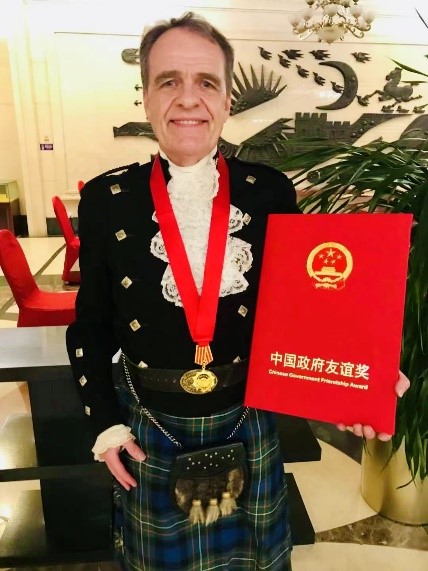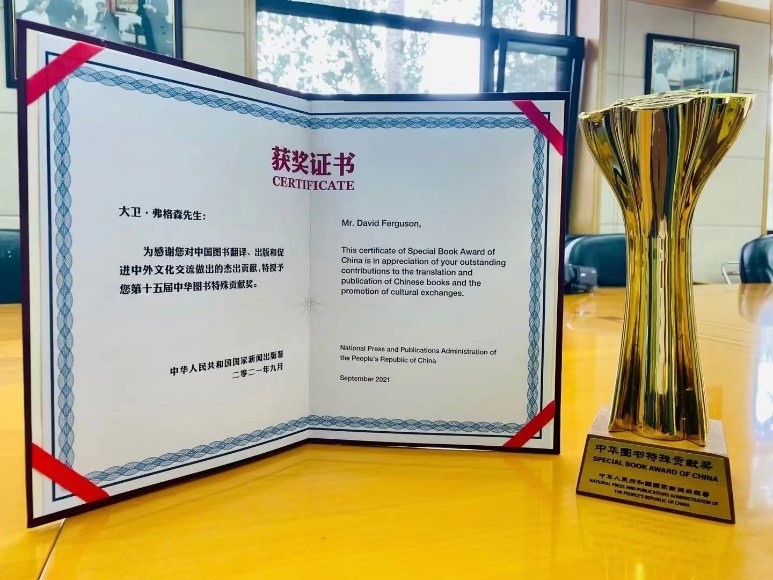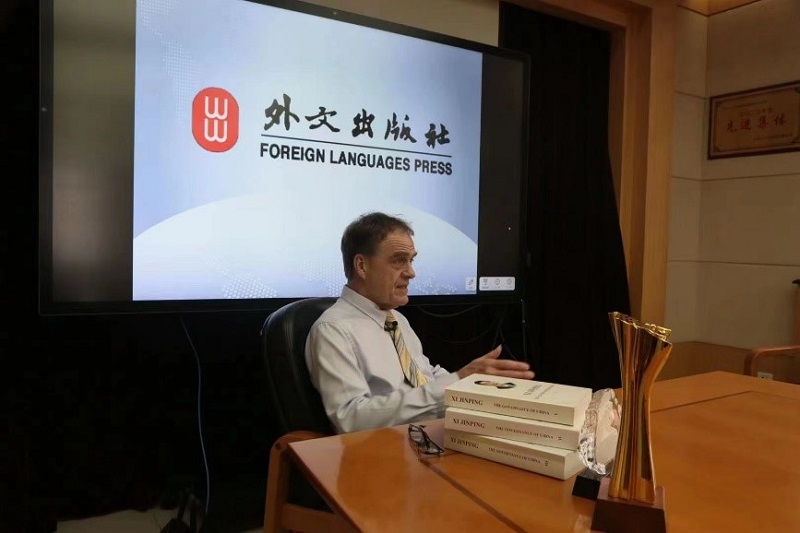風蕭蕭_Frank
以文會友David W. Ferguson
外文出版社主編:認為本國製度優於中國的西方人,我問你們一個簡單的問題
大衛.弗格森,外文出版社榮譽英文主編
https://www.youtube.com/watch?v=xHJgjyAmy_s&ab_channel=
People in the west always say our system is much better than China's system; because we have votes in elections, but this misses a very important Point, votes and elections are a process, not an outcome. Poor people in developing countries need outcomes, not processes. They need a roof over their heads, food on the day, clothes on the ground, school for the Kids, Safe Streets, a clean environment, Pension, Health Care, these are all outcomes not processes and China's whole process people's democracy has been very successive in delivering all these outcomes to 1.4 billion China's people, and so China's who process people's democracy is a good and effective system and to those in the west who continue to insist our system is superior to China's system. I have a very simple question, if your votes in elections are so much better than China's whole process people's democracy, why is India five times poorer than China, instead of five times richer, thank you.
The Scot Who Defends China
http://www.chinatoday.com.cn/ctenglish/2018/commentaries/202110/t20211019_800261106.html

David Ferguson receives the Friendship Award from the Chinese government on September 30.

The certificate and trophy for the Special Book Award of David Ferguson.

David Ferguson in an interview with reporters in September after he received the Special Book Award.
中國故事|大衛·弗格森:走過萬裏中國路的“文字匠人”
蘭花獎由中國外文局發起設立,旨在表彰獎勵弘揚全人類共同價值、為推進中外文化交流文明互鑒作出突出貢獻的國際友人。不久前,弗格森等10位國際友人獲頒首屆蘭花獎。頒獎詞中“觀中國、走中國、譯中國,十五年步履不停、筆耕不輟”是對弗格森的真實寫照。

大衛·弗格森在辦公室向記者展示他所獲得的蘭花獎獎杯。新華社記者 朱昊晨 攝
走過萬裏中國路
在華生活工作十餘年,今年67歲的弗格森在中國城鄉走過萬裏路,也閱過萬卷書。他曾是媒體記者,也是紀實作家,後入職外文出版社,參與了多本重要著作、政府白皮書的改稿潤色。
2004年,弗格森初次來到中國拜訪他未來的嶽父嶽母。“來中國之前,我對這裏一無所知。”他回憶道,中英文化千差萬別,但他竟完全沒有“水土不服”,被中國人熱情包容、重家庭、重教育等特質深深吸引,也發現這裏有更多機會。
兩年後,弗格森舉家來到中國發展。他欣喜於“第二故鄉”日新月異的變化,也憂心於西方媒體對中國的不實報道。“如果一個外國人主動要來中國當記者,我覺得對這個國家的評論至少要做到公正。”他說,出於這個原因,他決定做一名記者,講述真正的中國故事。
在之後幾年裏,弗格森報道了汶川地震、北京奧運會、上海世博會等大事件,也走訪多個省份記錄變化發展。在他眼中,基礎設施的進步折射了中國過去十年的發展。

2020年12月,弗格森第一次走進中國山區,前往甘肅省定西市和隴南市實地調研。“我們去了一個偏遠的村莊。十年前,從那裏到隴南市區要花上三天,而現在隻需要一個小時。”他說,所有村莊都通了柏油路,山與山之間有橋梁和隧道相連,一路通途。
“基礎設施建設對於扶貧和發展經濟至關重要。”他說,當地博物館展出了十年前的影像資料,村裏處處是破敗的房屋,村民們整天為水發愁。
“這裏翻天覆地的變化都是近十年來發生的。”他說:“村民的心態也在變化。”
弗格森說,不止是在貧困地區,回顧過去,每個中國人都可以說自己比父輩過得更好;如果有孩子的話,他們也可以確信自己的孩子將享受更好的生活。
“富裕的生活需要社會的長期穩定和秩序。”他說:“因為人民需要安全感,需要知道自己今天的努力不會在明天因為社會動蕩而付之一炬。”


9月22日,外文出版社榮譽英文主編大衛·弗格森在2023中華文化國際傳播論壇上發言。新華社記者 金良快 攝
中國成功的密碼裏寫著進取和韌性
弗格森認為,正是有了社會製度的保障,才讓中國製定了一個個長期目標並為之接續奮鬥。他說,中國特色社會主義製度是中國取得一個個矚目成就背後的密碼。
“向著富裕的生活努力工作,才能創造富裕的生活。”他說,一代代中國人的奮鬥對於中國的發展同樣重要。弗格森在他采訪過的很多中國人身上都看到了非凡的進取心和韌性。
受外文出版社邀約,弗格森曾前往“中國近代第一城”江蘇南通采風寫作,結識了一些紡織業從業者。“他們沒有受過正規的教育,沒有錢,也沒有商業和管理技能。令人難以置信的是,他們自學成才,自己創業、自己經營。”

其中一個人,在上世紀70年代初,僅背著一個裝滿刺繡枕套和桌布的背包,隨身帶著一本用拚音標記羅馬尼亞語發音的工具書,就隻身前往羅馬尼亞推銷紡織品,輾轉於兩國之間,一步步把跨國紡織生意做了起來。
弗格森在這些人身上看到了自己在南通“認識”的第一個人——張謇(1853年-1926年),也稱他們為張謇的“繼承人”。他說,張謇年輕時從未涉足工業,卻能興建造船、紡織等各種產業,辦氣象站、辦學校,引領南通的近代化事業,“是個非常傑出的人物,無所不能”。
“他們讓我深入了解中國人進取的天性特質。我理解為什麽中國人在商業上能取得成功,也明白了他們在其他國家能取得成功的原因,”他說,“因為,他們對成功有巨大決心。”


大衛·弗格森在辦公室接受新華社記者專訪。新華社記者 朱昊晨 攝
用文字記錄和觀察中國
弗格森把在南通的見聞寫成《南通故事》,而這次寫作經曆也成為他職業轉型的契機。2010年,弗格森作為編輯和撰稿人加入外文出版社,工作重心由新聞報道轉向編輯出版。
弗格森時常在數萬字的文稿中比較、推敲,反複斟酌用詞乃至標點。他說,他的工作是為了讓譯文在英語語境下得到最廣泛的認可。
他還作為紀實作家撰寫了《發現蘇州》《從貧困到富饒:甘肅美麗鄉村蛻變記》《生態北京:綠韻新城》等書籍,用文字記錄了自己對中國的觀察。
第一次聽說“斜杠青年”這個詞(指不滿足於“單一職業”的生活方式,而擁有多重職業和身份的年輕人),弗格森認為用“斜杠”形容自己的職業軌跡恰如其分。“除了做記者、做編輯,我還會講課、寫作。”他說:“你們可能不知道,此前我還做過足球經紀人。”

致力於政治文獻翻譯的弗格森對於中華文化也很有興趣。他對中國古代哲學思想、經典文學作品和曆史人物都頗為熟悉,還喜愛京劇,是資深“票友”。“我的兒子不僅喜歡京劇,還會唱。他可能是蘇格蘭唯一一個會唱京劇的英國人了。”弗格森打趣道。
弗格森發現,中國今天的很多國家治理理念都有古代哲學的影子。“中國文化中最優秀部分已延續數千年,例如天人合一、民為邦本等等,這些仍然體現在中國的治國理政中。”他說:“比如,全過程人民民主就是天下為公的體現。”
“我投入了大量時間進行政治文獻的翻譯,最近打算做些不一樣的事。”弗格森說,他在籌備一本書講述浙江的故事。在他看來,政治文獻翻譯和創意寫作都是讓外國受眾“讀懂中國”的路徑。
“建造故宮的人裏麵有工匠,也有幫他們搬運材料的人。翻譯家就是‘運木頭的人’。”他在蘭花獎獲獎感言中說:“我們建造的是發展、是繁榮、是世界和平。”




